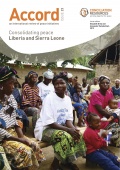March 27, 2012
Consolidating Peace: Liberia and Sierra Leone
Consolidating Peace: Liberia and Sierra Leone
Almost ten years on from the official end of wars in Sierra Leone (2002) and Liberia (2003), attention is shifting from post-war peacebuilding to longer-term development. What headway has been made? What challenges lie ahead? And what lessons that can be learned?
This latest issue in the Accord series draws on experiences and perspectives from across societies in both countries to explore comparative lessons and examine progress. It builds on analysis and recommendations from previous Accord publications on Liberia (Issue 1: 1996) and Sierra Leone (Issue 9: 2000).
Alliance for Peacebuilding (AfP) along with 3P hosted London-based Conciliation Resources for a discussion titled Consolidating Peace: Liberia and Sierra Leone. This event was held at Interaction on Tuesday March 27.
Experts from Conciliation Resources included Ms. Janet Adama Mohammed, West Africa Program Director and Mr. David Newton, Director of Policy, Practice and Communications. Ms. Mohammed and Mr. Newton shared their analysis on the current state of both Sierra Leone and Liberia's transitions from war to peace, the key challenges that threaten these transitions, and initiatives, both local and international, which respond to these threats. The discussion focused on themes of formal/informal justice and reconciliation mechanisms, extending access and services beyond the cities, security sector reform (SSR), better governance of resource sectors, and creating opportunities for alienated youth. The Accord publication argues that an improved social contract between the state and society is central to continued peacebuilding progress in both countries.
Click here for Conciliation Resources speaker profiles and for details about this event.













